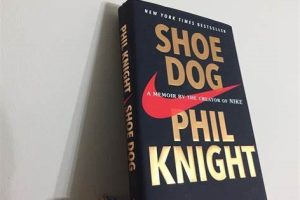
Unit 28
Book series: Shoe Dog, the Nike Story Part 1
新知思想/閱讀種子
New Knowledge/Reading Knowledge
BRAIN STORM
Share your ideas with your teacher and try to make sentences.
What do you think is the story all about?
VOCABULARY
Repeat these sentences after your teacher.
1. memoir (n.) 回憶錄、自傳
Shoe Dog is a memoir.
Shoe Dog是回憶錄。
2. studded (n.) 散佈著、充滿了
This book is studded with lessons.
這本書有很多教訓。
3. from scratch (v.) 從零開始、從頭開始
He started this company from scratch.
他從零開始創辦這家公司。
4. adversity (n.) 困境
You need to have the courage to pursue amidst adversity.
您需要有勇氣在逆境中追求。
5. ultimately (adv.) 最終
Despite the hardships, he ultimately succeeds.
儘管艱辛,他還是成功了。
6. leaving your mark on the world (phr.) 在世界上留下你的印記
Ultimately leaving your mark on the world.
最終在世界上留下自己的印記。
7. crisply (adj.) 利落地、乾脆地
Old books are crisply.
舊書很脆。
Dialogue
Read the dialogue aloud with your teacher.

Shoe Dog is a memoir by Phil Knight, the founder of Nike Rich with insight, humor and hard-won wisdom, this book is also studded with lessons – about building something from scratch, overcoming adversity, and ultimately leaving your mark on the world.
About business:
When you make, improve, or deliver something; when you add some new thing or service to the lives of strangers that makes them happier, healthier, safer, or better; and when you do it all crisply and efficiently, smartly, the way everything should be done but so seldom is — you’re participating more fully in the whole grand human drama.
《鞋狗》是耐克創始人Phil Knight的回憶錄。
這本書充滿了洞見、幽默和來之不易的智慧。書裡也處處都是珍貴的經驗:從如何白手起家創業、克服困難到最終在世界上留下自己的印記。
關於商業:
當你做出、改進或者交付一樣東西:當你做出新創意、提供新服務,讓陌生人的生活更快樂、更健康、更安全、更美好時。而且當你用更乾脆、更高效,更聰明的方法做這些事時,你就在更完整地參與人間這部宏偉的大戲。

More than simply being alive, you’re helping others to live more fully. If that’s business, all right, call me a businessman.
About the meaning of life:
Few ideas are as crazy as my favorite thing, running: It’s hard. It’s painful. It’s risky. The rewards are few and far from guaranteed.
When you run around an oval track or down an empty road, you have no real destination. At least, none that can fully justify the effort. The act itself becomes the destination.
About competing:
The art of competing, I’d learned from track, was the art of forgetting. You must forget your limits.
這不僅僅是活著,你是在幫其他人活得更好。如果這就是做生意,好,請叫我企業家。
關於生命的意義:
沒有多少想法比我最愛的跑步更加瘋狂:它很艱難、很痛苦、也很冒險。回報有限,而且毫無保證。
當你繞著環形跑道或在空曠的路上跑步的時候,你沒有真正的目的地。至少,沒有跟你的付出成正比的目的。你的跑動本身就成為了目的。
關於競爭:
競爭的藝術,是我從跑道上學來的,就是遺忘的藝術。你必須忘掉自己的種種極限。

You must forget your doubts, your pain, your past. And when it’s not possible to forget it, you must negotiate with it.
I thought over all the races in which my mind wanted one thing, and my body wanted another, those laps in which I’d had to tell my body, “Yes, you raise some excellent points, but let’s keep going anyway … “
About managing people :
Great leaders don’t say much. None was a blabbermouth. None micromanaged.
Don’t tell people how to do things, tell them what to do and let them surprise you with their results.
你必須忘掉自己的懷疑、痛苦和過去。當你不能忘記的時候,你必須學會和它們協商。
我回想自己跑過的無數比賽,我腦子想要一件事,而身體卻想要另一件。我只能不斷告訴自己的身體,“嗯,你提出的觀點有道理,但是,你還是得繼續跑下去……”
關於管人:
優秀的領導不會說太多。不會喋喋不休地高談闊論。不會事無鉅細地事事插手。
不要告訴員工怎麼做事,只需要告訴他們要做什麼,然後等待他們給你驚喜的結果。
Grammar
Meta、After、Beyond、About (it’s own category)
From a very young age, we are taught to raise our hands when we want to ask a question, and not to raise our voices when we are inside. We also often raise our glasses to celebrate a special person. That person might even be our boss, who we hope will raise our salary.
These expressions with “raise” are all pretty literal. Below, we‘d like to focus on a few other senses of the word “raise”, both figurative and idiomatic.
1.I can’t wait for the New Year’s party. We’re gonna raise the roof!
2.Since no objections have been raised, we’ll continue with the meeting.
3.My students raised some really interesting questions during today’s lecture. I’m so proud of them!
4.The local residents have begun raising a stink about the new taxes.
5.The official explanation for their separation is raising a few eyebrows.
6._____________________________________________________________________.
DISCUSSION
Make a conversation with your teacher.
1.What have you learned in the first part of the Shoe Dog Story?


